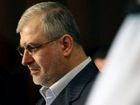Spotlight
-
 Lebanon
Israel strikes south and east Lebanon, south Beirut and Tripoli's Beddawi
Israel carried out strikes on Dahieh and South and east Lebanon Thursday, while Lebanese state media reported an Israeli drone strike killed a Hama...
Lebanon
Israel strikes south and east Lebanon, south Beirut and Tripoli's Beddawi
Israel carried out strikes on Dahieh and South and east Lebanon Thursday, while Lebanese state media reported an Israeli drone strike killed a Hama...
-
 Lebanon
Qassem says Hezbollah to confront Israel-US 'aggression', will not surrender
Hezbollah will confront "Israeli-American aggression" and will not surrender despite the "imbalance in capabilities", the head of the Iran-...
Lebanon
Qassem says Hezbollah to confront Israel-US 'aggression', will not surrender
Hezbollah will confront "Israeli-American aggression" and will not surrender despite the "imbalance in capabilities", the head of the Iran-...
Hezbollah on Tuesday said it targeted three Israeli military bases in response to Israeli strikes on the group's strongholds in Lebanon, including the south Beirut suburbs.
Israel continues to carry out successive air raids, particularly on Beirut's southern suburbs and the south of the country, after sometimes issuing evacuation warnings to residents, while Lebanese authorities on Monday recorded the displacement of around 29,000 people from areas hit by the strikes.
 Full Story
Full Story
Loud explosions were heard in Beirut on Monday evening, as Lebanese state media reported strikes on the capital's southern suburbs after the Israeli military said it struck 70 Hezbollah targets.
AFP journalists heard loud blasts in the city. The state-run National News Agency said "enemy warplanes launched new raids on the southern suburbs".
 Full Story
Full Story
Israel struck Lebanon on Monday as Iranian counterattacks hit Gulf states and a British base in Cyprus. International gas prices rose and shares went down.
Several strikes hit south and east Lebanon and Beirut's southern suburbs after Israeli evacuation warnings. The Palestinian Islamic Jihad's armed wing said its commander in Lebanon was killed in the strikes.
 Full Story
Full Story
The Palestinian Islamic Jihad’s armed wing said on Monday that its commander in Lebanon was killed in Israeli strikes on Beirut’s southern suburbs.
In a statement, the Quds Brigades said Adham Adnan al-Othman, the head of the armed wing in Lebanon, was killed "as a result of the treacherous Zionist aggression that targeted the southern suburbs of Beirut, at dawn on Monday".
 Full Story
Full Story
Hezbollah condemned on Monday the government's decision to ban its military activities, while Israel carried out retaliatory strikes in response to rockets fired by the Iran-backed group.
In a statement, Mohammad Raad, the head of the group's parliamentary bloc, condemned Beirut's "swaggering decisions", saying that "the Lebanese were expecting a decision rejecting the (Israeli) aggression".
 Full Story
Full Story
The U.S. Embassy in Lebanon renewed its call for citizens to leave Lebanon immediately as the Middle East war expanded to Lebanon.
 Full Story
Full Story
Several strikes hit Beirut's southern suburbs on Monday after Israeli evacuation warnings, as Israel attacked the country following Hezbollah's dawn missile launches.
 Full Story
Full Story
Free Patriotic Movement leader Jebran Bassil on Monday warned against another “support war” in Lebanon, after Hezbollah fired rockets at Israel drawing massive Israeli retaliation.
“We warned against a war to support Gaza because it would only bring ruin to Lebanon and to those who waged it, and it would not be able to save Gaza, and so it was! We warn again against a war to support Iran because it will bring us more ruin without saving Iran. Neutralize Lebanon and leave it as a homeland for the Lebanese. It is not at the service of Iran or Israel,” Bassil said in a post on X.
 Full Story
Full Story
Lebanese civilians fled from the country's south and from Beirut's southern suburbs on Monday, seeking refuge in schools in Lebanon's capital following a new and deadly escalation between Israel and the Iran-allied Lebanese militant group Hezbollah.
Lebanon's Health Ministry reported at least 31 people were killed and 149 wounded in overnight strikes in the Beirut suburbs and southern Lebanon.
 Full Story
Full Story
The Israeli military said it killed the head of Hezbollah's intelligence services, Hussein Moukalled, in a strike in Dahieh overnight.
"The IDF now confirms that in a precise strike in Beirut last night (Sunday), the terrorist Hussein Moukalled, who served as the head of Hezbollah's intelligence headquarters, has been eliminated," the army said in a statement on Monday.
 Full Story
Full Story



